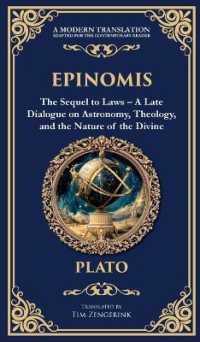- ホーム
- > 洋書
- > 英文書
- > History / World
Full Description
Why do dictatorships have elections? Dictatorship and the Electoral Vote analyses the role of elections in two dictatorships that were born in the Era of Fascism but survived up to the 1970s: the Portuguese New State and Francoism. A comparative study of the electoral vote held by both dictatorships is revealing at many organizational and structural levels. The multiple political interactions involved in elections worldwide have been subject to social science scrutiny but rarely encompass historical context. The analysis of the electoral vote held by Iberian dictatorships is uniquely placed to link the two. The issues to hand include: drawing of electoral rolls; evolution of the number of people allowed to vote; candidate selection processes; propaganda methods; impact on the institutional structure of the regime; the socio-political biographies of the candidates; the electoral turnout and final tally; relationship between the central and peripheral authorities of the state; and the viewpoint of regime authorities on the holding of elections. Comparative analysis of all these issues enables a better understanding of the political nature of these dictatorships as well as a comprehensive explanation of the historical roots and evolution of the elections these dictatorship held since 1945. Based on primary archival documents, some of them never previously accessed, the book offers a detailed explanation of how these dictatorships used elections to consolidate their political authority and provides a historical approach that allows placing both countries in the framework of European electoral history and in the history of the political evolution of Iberian dictatorships between the Axis defeat and their breakdown in the mid-seventies.








